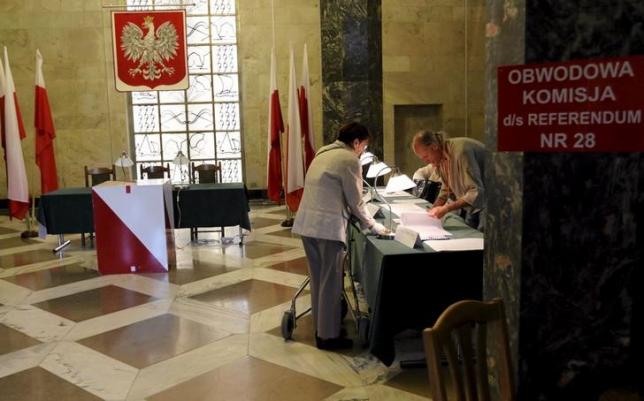Poland's main parties present election promises to lure voters
WARSAW: Poland's ruling Civic Platform (PO) party and opposition Law and Justice (PiS) announced their economic programmes on Saturday, vying for voters before the October parliamentary elections.
The PO party, which is trailing the PiS in opinion polls, said it plans to introduce progressive unified personal tax rates, which will include mandatory pension and healthcare contributions, now paid separately.
"This is a project of a great change in the tax philosophy in Poland," Prime Minister Ewa Kopacz said at a party convention.
Finance Minister Mateusz Szczurek told state PAP agency that the new personal taxes will consist of a progressive rate from 10 percent up to 39.5 percent for families with the highest income per member.
He said the proposal, to be introduced in 2017 or 2018, would lower the total burden for taxpayers from personal taxes, healthcare and pension contributions.
The PO party said the new tax rate would cost the budget about 10 billion zlotys ($2.7 billion) and broaden the tax base by curbing temporary employment contracts.
Poland has one of the highest number of such temporary employment contracts in the European Union. These contracts allow people to earn higher wages but give little or no social security such as pensions and healthcare benefits.
The party said it would stick to a self-imposed spending rule and would hit a target of 1 percent of GDP for the structural deficit within 4 years thanks to, among other things, a more efficient collection of the value added tax (VAT).
The popularity of PO, which has ruled since 2007 and oversaw a period of economic prosperity, has suffered since 2014 over leaks relating to the secret recording of senior officials drinking expensive wine in Warsaw restaurants, making profane remarks about colleagues and hatching political schemes.
It led to a purge in the government, including that of four ministers and a parliament speaker earlier this year.
LAW AND JUSTICE
In its election programme, the opposition PiS party upheld its earlier plans of a new tax on banks and supermarkets, lower taxes for small firms, but announced a pledge for free medicine for people over 75 years old.
The party, which leads a socially conservative opposition alliance, said in July it wants to raise public spending by 2.3 percent of GDP on policies such as lowering the retirement age and raising child benefits.
Most of the financing would come from more efficient tax collection, PiS said back then.
A Standard and Poor's (S&P) rating analyst warned in August that Poland risked losing the positive outlook on its A- rating if it suspends or breaks its current spending rule.
PiS has managed appeal to Poles unhappy with low wages and the pervasive temporary employment contracts, especially those living in poorer parts of the country.
Poland's economy grew by over 25 percent since the start of 2008, the most in Europe, but on average Poles still earn less than 30 percent of what Germans do.
Both parties said they plan to introduce a minimum hourly wage. PiS party said it would be set at 12 zlotys per hour, while (PO) said it would be at least that level.
A recent opinion poll showed PiS is supported by 38 percent of Poles, compared to 23 percent for PO ahead of the Oct.25 vote, but the result of polls can change rapidly.






